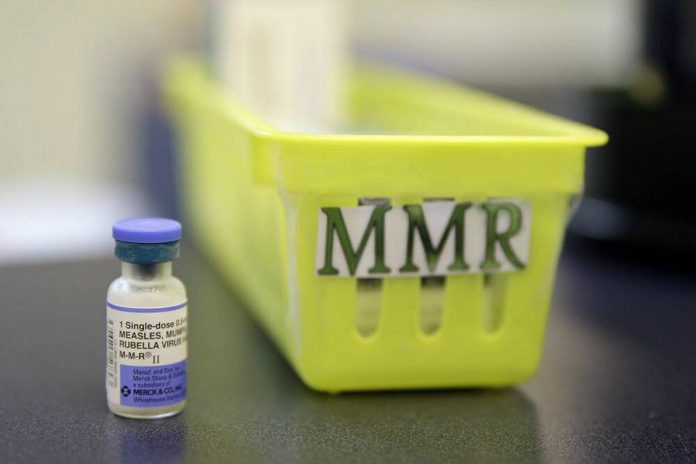
As the number of cases of measles “rapidly” increases worldwide, both the Haliburton, Kawartha, Pine Ridge District Health Unit (HKPRDHU) and Peterborough Public Health (PPH) are calling on parents to have their children immunized.
Measles is a highly contagious, serious airborne infectious disease that is prevented by vaccination, HKPRDHU said.
In Ontario, five cases of measles have been reported over the past few weeks. As a result, PPH is “strongly urging” residents, especially parents of young children, to review their immunization records and get up to date with measles vaccines.
Both area medical officers of health (MoH) said the timing to heed the advice is now, with March Break approaching and some residents travelling out of Canada.
There are cases in the country being linked to travel, noted Dr. Thomas Piggott, MoH and CEO for PPH.
“For those travelling this time of year, we are urging residents to avoid bringing home measles as their souvenir,” Piggott said in a media release. “Measles is a highly infectious virus that can be deadly for those who are not protected. Receiving a vaccine is the best protection against an infection.
Two doses of the measles, mumps, rubella (MMR) vaccine or the measles, mumps, rubella, varicella (MMRV) vaccine are available free of charge for everyone in Ontario from a health care provider.
While immunization may take two to three weeks to provide full protection, ensuring protection before travel for March Break — or being protected in general — “is still important for everyone,” PPH noted.
PPH is encouraging residents to review their immunization records online or over the phone, consult their yellow book record, or contact their health care provider to determine if they are protected against measles.
Residents born after 1970 who have not had a measles vaccine or who are unsure about receiving a measles vaccine are encouraged to receive at least one dose from their health care provider before travelling. Residents born before 1970 are assumed to have had measles in childhood and considered protected. However, in some cases, residents should still discuss their individual risk with their health care providers, PPH said.
VIDEO: Five things to know about measles – World Health Organization
Although measles was declared eliminated in Canada in 1998, with endemic transmission no longer taking place, outbreaks can still happen when susceptible individuals — those who aren’t vaccinated — travel to and return from other countries where measles is circulating, HKPRDHU noted.
Most of these cases involve unvaccinated or under-vaccinated children. However, a non-travel, vaccinated measles case has been reported in Ontario, the health unit noted.
According to Health Canada, only 79 per cent of the population has been vaccinated for measles.
“Due to the impacts of the COVID-19 pandemic, some children have had delays of their routine childhood immunizations, which includes the MMR vaccination, and leaves them at risk of contracting measles,” said Dr. Natalie Bocking, MoH and CEO for HKPRDHU.
“With the rise in measles cases, we’d like to remind and encourage people to ensure all your immunizations are up to date, including the MMR vaccine, particularly before travelling internationally this March Break.”
The health units noted that staying up to date with the measles vaccine is still recommended for both residents who have returned from travel and those who don’t plan to travel.
Residents who have returned from travelling are being asked to monitor for signs and symptoms of measles. Symptoms usually appear four to 14 days after exposure to the virus.
The symptoms include a runny nose, a cough, red and watery eyes, a high fever, and small white spots inside the cheeks and mouth. The rash associated with measles, which can appear all over the body, typically occurs between days seven and 18 of the disease’s onset.
Anyone who experiences any of these symptoms after travel is asked to contact their health care provider by phone and avoid attending any public settings. Residents who believe they have been in contact with the measles virus while travelling should do the following:
- Return to Canada wearing a well-fitting mask (preferably N95/KN95 style)
- Limit unnecessary contact with others
- Monitor closely for symptoms
To learn more about the measles virus and risk associated with it, visit peterboroughpublichealth.ca/yourhealth/measles/ or hkpr.on.ca/health-topics/infections/measles/.
To review Ontario’s routine immunization schedule, visit ontario.ca/page/ontarios-routine-immunization-schedule.


























